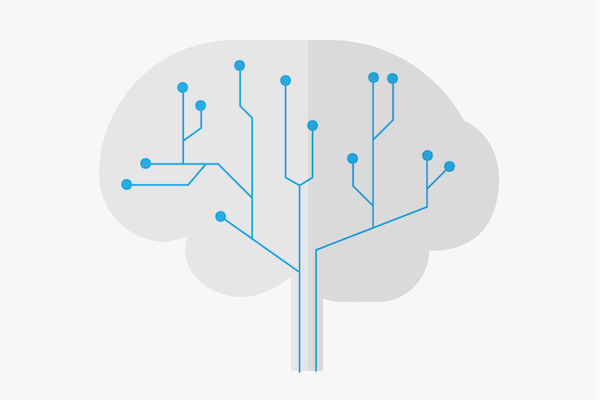Cognitive Computing
Cognitive computing is an attempt to mimic the way the human brain works or simulate human thought processes with computer technology.
The prerequisite for this kind of artificial intelligence is that the system is not programmed in advance for all possible solutions, but instead the computer system learns independently. Cognitive computing is an approach on how to process the immense amount of data that results from Big Data.
Background
IT systems can already perform a lot of work that people had to do previously. But usually, the human brain is a big step ahead of artificial intelligence. Because it can react individually to previously unknown problems by automatically searching for a solution. The brain draws on any experiences, events, and material learned and stored previously.
For a long time, computers were unable to compete with the processing power of the human brain. They lacked the necessary storage capacity and processing power required for complex operations. Through continuous development of both areas and through consistent research in the field of algorithmic data processing, significant progress has been made in artificial intelligence. Cognitive computing is in fact an evolution towards artificial intelligence.
Implementation and Example
Certain conditions must be in place in order to achieve results with cognitive computing. Usually, a great number of processors and computers are connected to perform large computing operations.
One of the best known examples of cognitive computing is the “Watson” computer developed by IBM. This IT company product went into competition against people in the quiz show Jeopardy in 2011. This supercomputer was able to answer questions and recognize dialects and puns.
The special feature of “Watson” was that the computer was working purely on the basis of learned information, because it was not connected to the Internet.
Requirements
Cognitive functioning computer systems must meet several requirements before they can work similarly to the human brain:
- Cognitive computing must be interactive to communicate both with people and with other devices.
- Complex computer systems must be adaptable. They need to learn that information can change. At the same time, it is essential that these systems detect ambiguities and can respond to unforeseen changes. Thus, these systems must also be able to process data in near real time.
- Processes of cognitive computing must be condition-based. At the same time, the goal-oriented work with such systems requires that they always find the right solution to a problem on the basis of already made experiences through repetition.
- Computers with artificial intelligence have to understand the context. This means that they must be able to recognize the importance of statements, their syntax, the appropriate time, locations, and other contextual characteristics. At the same time, these systems have to deal with different input methods, i.e. voice, gesture or text-based user input.
Areas of application
Cognitive computing can be used in many areas today. It may be used in financial planning, manufacturing or medicine, for example. Cognitive computing can also be found in the Internet industry.
- E-Commerce: Algorithms identify suitable product recommendations for consumers based on their user profiles and the general behavior of visitors of an Internet store.
- Customer relationship management: Hotlines often work on the basis of cognitive computing whereby voice computers recognize the oral statements of the customer, process them, and present appropriate solutions.
- Search engines: Web search engines such as Google use cognitive computing to handle queries better. Since the Hummingbird update, Google is partially able to understand two-level user requests and return the appropriate response. The search algorithm continuously learns with logged-in Google users and adapt the search results accordingly.
Consequences for SEO
Cognitive computing could change the requirements for search engine optimization in the future. Thus, it is conceivable that websites might be even far more interactive than they are today. Integration of artificial intelligence is an important aspect of websites especially in e-commerce. Virtual sales consultants and computers that can answer telephone customer queries directly or chat with customers are possible. Thus, cognitive computing could increase the relevant ranking usability of a website significantly.
Even in terms of content, cognitive approaches may result in changes. Web content could be dynamically adapted to the requirements of registered users by means of algorithms. Texts, images, and other elements of websites would then no longer be created by a human, but by self-learning computer programs. Whether this modified web content would eventually affect the ranking of individual websites and how search engines should crawl this kind of content, would be another problem that SEOs will have to address in the future.
Web Links

